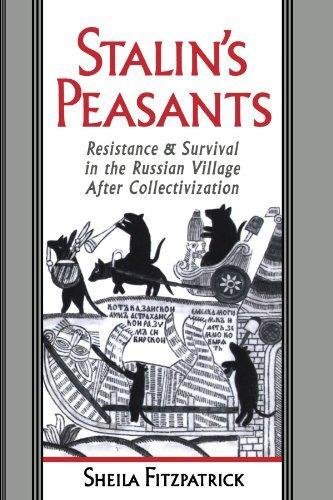Stalin's Peasants: Resistance and Survival in the Russian Village after Collectivization
Stalin's Peasants: Resistance and Survival in the Russian Village after Collectivization
Formas de Pago
- PayPal
- Tarjeta de crédito
- Transferencia Bancaria
- Pubblica amministrazione
- Carta del Docente
Detalles
- Autor
- Fitzpatrick Sheila
- Editores
- Oxford University Press, USA, 1994
- Materia
- Russia
- Descripción
- Ffine
- Descripción
- Cloth in Dj
- Sobrecubierta
- False
- Conservación
- Excelente
- Copia autógrafa
- False
- Primera edición
- False
Descripción
8vo, hardcover in dj. ppxvii-313.Summary: Drawing on newly-opened Soviet archives, especially the letters of complaint and petition with which peasants deluged the Soviet authorities in the 1930s, Stalin's Peasants analyzes peasants' strategies of resistance and survival in the new world of the collectivized village. Stalin's Peasants is a story of struggle between transformationally-minded Communists and traditionally-minded peasants over the terms of collectivization--a struggle of opposing practices, not a struggle in which either side clearly articulated its position. But it is also a story about the impact of collectivization on the internal social relations and culture of the village, exploring questions of authority and leadership, feuds, denunciations, rumors, and changes in religious observance. For the first time, it is possible to see the real people behind the facade of the "Potemkin village" created by Soviet propagandists. In the Potemkin village, happy peasants clustered around a kolkhoz (collective farm) tractor, praising Stalin and promising to produce more grain as a patriotic duty. In the real Russian village of the 1930s, as we learn from Soviet political police reports, sullen and hungry peasants described collectivization as a "second serfdom," cursed all Communists, and blamed Stalin personally for their plight. Sheila Fitzpatrick's work is truly a landmark in studies of the Stalinist period--a richly-documented social history told from the traumatic experiences of the long-suffering underclass of peasants. Anyone interested in Soviet and Russian history, peasant studies, or social history will appreciate this major contribution to our understanding of life in Stalin's Russia

